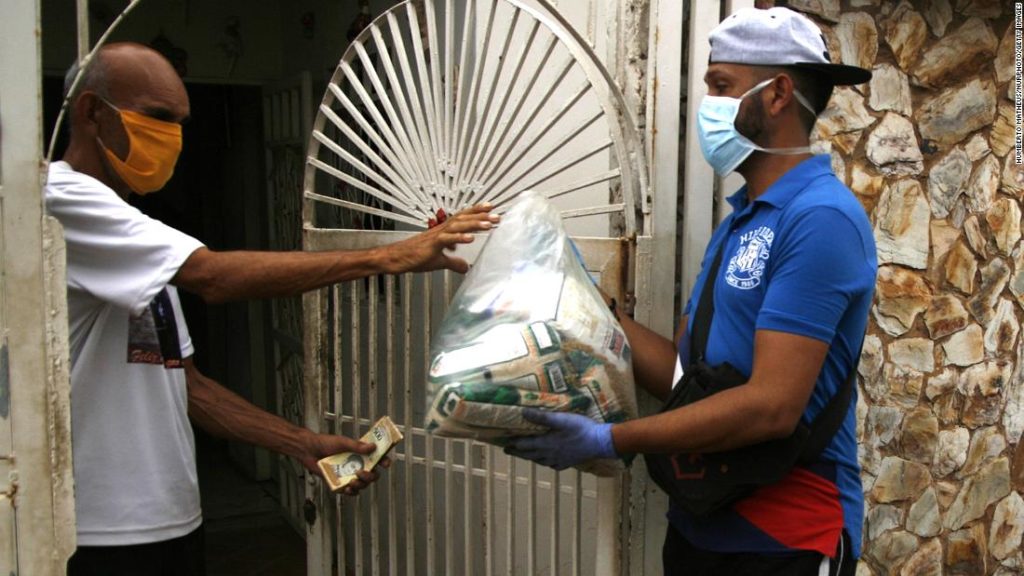Venezuela’s state-controlled economy began to decline in 2014 with falling oil prices and has been corroded by mismanagement and corruption. By the time the US first imposed broad economic sanctions in 2017, Venezuela already had the highest inflation in the world and was experiencing chronic shortages of basic goods.
However, Douhan’s report emphasizes that existing “calamities” were exacerbated by “unilateral sanctions increasingly imposed by the United States, the European Union and other countries.”
Such sanctions, she said, wield “a devastating effect…on the broad scope of human rights, especially the right to food, right to health, right to life, right to education and right to development.”
The effect of ‘maximum pressure’
The Trump administration dramatically expanded economic sanctions on Venezuela from 2017 onward, and was joined by other countries in piling pressure on the regime as National Assembly leader Juan Guaido challenged embattled President Nicolás Maduro.
“Impediments to food imports, constituting more than 50 per cent of food consumption, have resulted in the steadily growth of malnourishment in the past 6 years,” Douhan’s report reads, noting that hungry Venezuelans’ “coping mechanisms” include reducing their number of meals per day, selling household assets, and child labor, among other things.
The impact of trade sanctions is particularly felt today in the Venezuelan countryside, where agricultural activities have all but stopped since imports of diesel fuel dried up. Venezuela is still capable of refining limited amounts of normal gasoline but cannot refine diesel, used in heavy trucks and agricultural machinery. Many farmers have been forced to leave their fields unattended as their machinery stood still.
Douhan was particularly critical of sanctions directed at Venezuelan oil exports. Because Venezuela depends on oil exports, a US-imposed embargo since early 2019 has effectively strangled the entire economy and hamstrung any policy solutions.
She also called on the US, the UK and Portugal to release frozen Venezuelan foreign assets — estimated at $6 billion — so that Maduro’s government can purchase supplies needed to confront the Covid-19 pandemic.
Maduro and the US react
But absent from his speech was any reference to Douhan’s appeals to his own government to facilitate the work of non-governmental organizations in Caracas, several of which have been heavily persecuted by Maduro’s state forces.
Nevertheless, Douhan described the ultimate economic toll of sanctions on ordinary Venezuelans as unjustifiable, and noted that the US-led “maximum pressure campaign” also “violates the principle of sovereign equality of states and constitutes an intervention in the domestic affairs of Venezuela.”
“Humanitarian concerns shall always prevail on political ones,” she said.
A State Department spokesperson for the Bureau of Western Hemisphere Affairs told CNN that it welcomed UN examination of Venezuela but criticized Douhan’s fact-finding.
“We welcome United Nations examination and monitoring of the deteriorating situation in Venezuela. As recent reports from the Office of the High Commissioner on Human Rights have shown, human rights abuses continue to escalate at the hands of Maduro and his cronies.”
“Instead of meeting with NGOs, independent journalists, members of the opposition, political prisoners, and other victims of harassment and attacks directed by Maduro and his supporters, the UN Special Rapporteur visiting Caracas spoke almost only to regime insiders and others the regime authorized,” they said.
Douhan has said she “sought to meet the widest range of people to listen to their experience and insights,” including government officials and opposition figures in and outside of Parliament, as well as opposition leader Guaido. Humanitarian organizations and representatives from the church and civil society were also consulted, according to the report.
Reporting contributed by CNN’s Jenny Hansler in Washington.
You may also like
-
Afghanistan: Civilian casualties hit record high amid US withdrawal, UN says
-
How Taiwan is trying to defend against a cyber ‘World War III’
-
Pandemic travel news this week: Quarantine escapes and airplane disguises
-
Why would anyone trust Brexit Britain again?
-
Black fungus: A second crisis is killing survivors of India’s worst Covid wave

